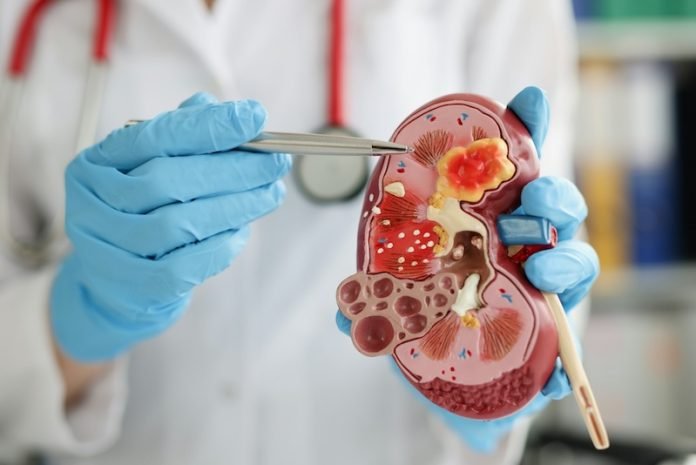
Kidney cancer, a formidable opponent hidden within the body’s intricate system, remains a challenge for many. Despite its stealthy nature, advancements in medical science have shed light on this disease, offering hope and clarity.
This exploration into kidney cancer will demystify symptoms, treatments, and stages, all presented in straightforward terms.
Through the lens of recent research and expert insights, we aim to provide a comprehensive view that’s accessible to all, making sense of a complex condition without the jargon.
Kidney cancer begins in the kidneys, two bean-shaped organs that play a vital role in filtering blood, removing waste, and managing electrolyte balance. It often lurks unnoticed, with symptoms that may whisper rather than shout, making early detection a puzzle.
The most common type of kidney cancer in adults is renal cell carcinoma, which quietly takes root in the lining of tiny tubes inside the kidneys.
Symptoms, when they decide to emerge, can include blood in the urine (turning it pink, red, or cola-colored), persistent back pain just below the ribs, unexplained weight loss, fatigue, and intermittent fever. These signs are like subtle hints, suggesting something is amiss.
However, they can also be attributed to less severe conditions, which is why kidney cancer often goes undiagnosed until it progresses.
Treatment strategies for kidney cancer are as varied as the disease itself, tailored to the individual’s specific condition and the cancer’s stage. Surgery stands as the cornerstone, aiming to remove the cancerous cells while preserving as much of the kidney as possible.
Techniques range from removing only the tumor (partial nephrectomy) to removing the entire kidney (radical nephrectomy), depending on the cancer’s extent.
For cases where surgery isn’t viable, targeted therapies come into play. These treatments focus on specific aspects of cancer cells that allow them to grow and thrive.
By targeting these areas, the treatments can block the growth and spread of cancer cells while minimizing damage to normal cells.
Immunotherapy, another frontline defense, empowers the body’s immune system to recognize and destroy cancer cells. It’s akin to training the body’s natural defenses to spot and combat the enemy more effectively.
Radiation therapy and cryoablation offer additional arrows in the quiver against kidney cancer. Radiation therapy uses high-energy rays to target and kill cancer cells, while cryoablation freezes the cancer cells to death.
Each treatment has its place, with decisions made based on the cancer’s stage, the patient’s overall health, and the goal of therapy.
Speaking of stages, kidney cancer is classified into four primary stages, reflecting the cancer’s growth and spread. Stage I and II focus on tumors confined to the kidney, with Stage I being smaller in size.
Stage III indicates that the cancer has begun to venture beyond the kidney, possibly reaching nearby lymph nodes. Stage IV, the most advanced stage, signals that the cancer has embarked on a journey to distant parts of the body.
Understanding the stages helps guide treatment decisions, providing a roadmap for the journey ahead. It also offers insight into the prognosis, with early-stage cancers typically having a more favorable outlook.
In conclusion, kidney cancer, with its silent onset and complex nature, poses a significant challenge. However, armed with knowledge about its symptoms, treatment options, and stages, individuals can navigate this journey with greater confidence.
As research continues to advance, the hope for more effective treatments and ultimately, a cure, grows brighter. The battle against kidney cancer is a team effort, combining the expertise of healthcare professionals with the strength and resilience of those affected.
If you care about kidney health, please read studies about how to protect your kidneys from diabetes, and drinking coffee could help reduce risk of kidney injury.
For more information about kidney health, please see recent studies about foods that may prevent recurrence of kidney stones, and eating nuts linked to lower risk of chronic kidney disease and death.
Copyright © 2024 Knowridge Science Report. All rights reserved.



